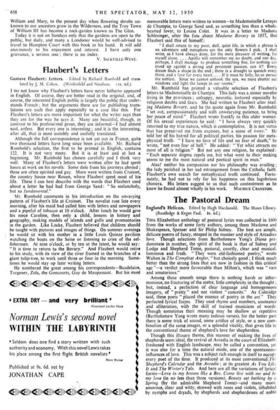Flaubert's Letters
Gustave Flaubert : Letters. Edited by Richard Rumbold and trans- lated by J. M. Cohen. (Weidenfeld and Nicolson. as. 6c1.) I no not know why Flaubert's letters have never hitherto appeared in English. Of course, they are better read in the original, and, of course, the interested English public is largely the public that under- stands French ; but the arguments there are for publishing trans- lations are such that apply especially to a case like this. For Flaubert's letters are more important for what the writer says than they are for the way he says it. Many are beautiful, though, in contrast to his professional prose, they are informal—I had almost said, artless. But every one is interesting ; and it is the interesting, after all, that is most suitably and usefully translated.
Although the full correspondence is not yet out in France, quite two thousand letters have long since been available. Mr. Richard Rumbold's selection, the first to be printed in English, contains 122. It is not very many. But it is at least and at last a beginning. Mr. Rumbold has chosen carefully and I think very well. Many of Flaubert's letters were written after he had spent hours at work on his novels. Some date from his journeys abroad ; these are often spirited and gay. More were written from Croisset, the country house near Rouen, where Flaubert spent most of his life. These I can best describe with the words that Flaubert used about a letter he had had from George Sand: " So melancholy, but so fundamental."
Mr. Rumbold comments in his introduction on the unvarying pattern of Flaubert's life at Croisset. The novelist rose late every morning, after his maid had called him with letters and newspapers and a pipeful of tobacco at 10 o'clock. After lunch he would give his niece Caroline, then only a child, lessons in history and geography, making models of islands and gulfs and promontories in the garden. Like Locke, Flaubert believed that children should be taught with pictures and images of things. On summer evenings he would sit with his mother in a little Louis Quinze pavilion watching the boats on the Seine or listening to cries of the eel- fishermen. At nine o'clock, or by ten at the latest, he would say: " It is time to return to the Bovary." And Flaubert would retire to his study, with its view of the river framed in the branches of a giant tulip-tree, to work until three or four in the morning. Some- times he would stay up later writing letters.
He numbered the great among his correspondents--Baudelaire, Turgenev, Zola, the Goncourts, Guy de Maupassant. But his most memorable letters were written to women—to Mademoiselle' Leroyer de Chantpie, to George Sand and, as something less than a whole- hearted lover, to Louise Colet. It was in a letter, to Madame Schlesinger, after the fuss about Madame Bovary in 1857, that Flaubert said this of himself : "I shall return to my poor, dull, quiet life, in which a phrase is an adventure arid metaphors are the only flowers I pick. I shall write, as I have always done, for the mere pleasure of writing, for myself alone.... Apollo will remember me no doubt, and one day, perhaps, I shall manage to produce something fine, for nothing can stand up agairist a strong and persistent passion, can it? Every dream finds a shape in the end ; there is a draught to quench every thirst, and a love for every heart.... If it must be folly, let us pursue the noblest. Since we cannot unhook the sun, we must shutter our windows and light the lamps in our rooms."
Mr. Rumbold has printed a valuable selection of Flaubert's letters to Mademoiselle de Chantpie. This lady was a minor novelist living in the provinces ; unhappy, neurotic, tortured especially by religious doubts and fears. She had written to Flaubert after read- ing Madame Bovary, and he (to quote again from Mr. Rumbold) " set out, compassionately and with unwearying patience, to bring her peace of mind." Flaubert wrote frankly to this older woman. Of his sexual experiences he said: " I have always very quickly returned to my true nature, which is contemplative. It is not virtue that has preserved me from excesses, but a sense of irony." He told her of his hatred for all political _parties, his passion for meta- physical truth. " I have no love of life and no fear of death," he wrote, "not even fear of hell." He added: " Yet what attracts me most of all is religion." But not any one religion, he explained: " Each separate dogma repels me, but what went to their making seems to me the most natural and poetical spirit in Man."
Alas! neither his compassion nor his philosophy was availing ; the lady perished in her sad estrangement from the Catholic faith. Flaubert's own search for metaphysical truth continued. Fortu- nately, he had not to rely for his happiness on this lugubrious chimera. His letters suggest to us that such contentment as he knew he found almost wholly in his work. MAURICE CRANSTON.






































 Previous page
Previous page